Almond Tree Not Producing Nuts: Causes For An Almond Tree With No Nuts
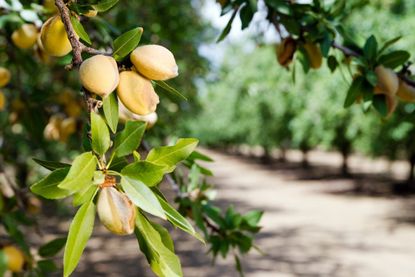

Almonds are both tasty and nutritious, so growing your own was a great idea – until you realized your tree wasn’t producing. What good is an almond tree with no nuts? The good news is that you should be able to fix the problem with a few simple steps.
Why Won’t My Almond Tree Fruit?
So maybe getting nuts from your almond tree wasn’t the only reason you planted it. It provides shade and height for your landscape, but you also really hoped to get a harvest of almonds out of it. An almond tree not producing nuts can be a big disappointment. One reason that you may not be seeing nuts yet is that you just haven’t waited long enough. Nut trees can take a few years to begin producing. For almonds, you may have to wait until it is four years old before you see nuts. So, if you got a tree from the nursery and it was only one year old, you may just need to be patient. Once it gets going, you can expect up to 50 years of yields. Another issue may be pollination. Most cultivars of almond trees are not self-pollinating. This means they need a second tree in the area for cross-pollination in order to bear fruit. Depending on the cultivar you chose, you may need to select another one for your yard, so that pollinators, like bees, can do their jobs and transfer pollen from one to the other. If you don’t have the right combination, you will get no nuts on an almond tree. For example, two trees of the same cultivar will not cross-pollinate. Some of the common almond cultivars used to produce nuts are ‘Nonpareil,’ ‘Price,’ ‘Mission,’ ‘Carmel,’ and ‘Ne Plus Ultra.’ One cultivar of almond, called ‘All-in-One,’ will self-pollinate and can be grown alone. It can also pollinate the other cultivars. If you have an almond tree with no nuts, there is likely to be one of two possible and simple solutions: wait a little longer or get a second tree for pollination.
Gardening tips, videos, info and more delivered right to your inbox!
Sign up for the Gardening Know How newsletter today and receive a free download of our most popular eBook "How to Grow Delicious Tomatoes."

Mary Ellen Ellis has been gardening for over 20 years. With degrees in Chemistry and Biology, Mary Ellen's specialties are flowers, native plants, and herbs.
-
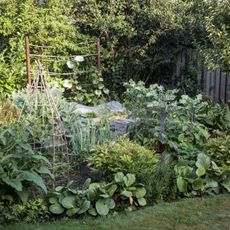 Foodscaping: The Most Beautiful Way To Grow Your Own Food
Foodscaping: The Most Beautiful Way To Grow Your Own FoodFoodscaping is a beautiful and profoundly practical way to mix beauty and function in your yard. Try food landscaping for a real sense of abundance.
By Bonnie L. Grant
-
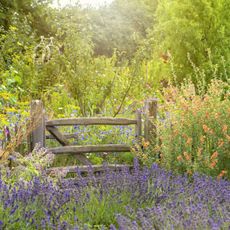 9 Natural Landscaping Ideas For A Garden That Looks Like It’s Always Been There
9 Natural Landscaping Ideas For A Garden That Looks Like It’s Always Been ThereRead about 9 natural landscaping ideas that will inspire you! Create and enjoy a natural garden and even a natural landscape design.
By Mary Ellen Ellis
-
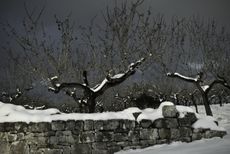 Almond Winter Care – What To Do With Almonds In Winter
Almond Winter Care – What To Do With Almonds In WinterWith early blooms in mild climates, almond trees are making their way into the landscape, providing homeowners with early spring blooms, healthy nuts and an attractive landscape plant. Click this article for tips on what to do with almonds in the winter.
By Darcy Larum
-
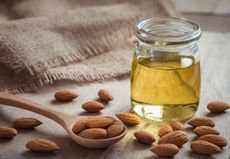 Almond Oil Information: Tips For Using Almond Oil
Almond Oil Information: Tips For Using Almond OilAlmond oil is nothing new. But exactly what is almond oil and how do you use it? The following article contains almond oil information. Learn about the uses of almond oil and more. Click here to learn more.
By Amy Grant
-
What Is Hull Rot: Learn How To Avoid Rotting Nut Hulls
Almond hull rot is a fungal disease that affects the hulls of nuts on almond trees. It can cause big losses in almond farming, and the occasional backyard tree. Understanding basic identifying factors can help you manage this disease. Learn more in this article.
By Mary Ellen Ellis
-
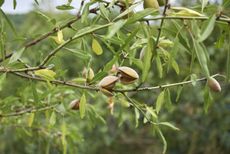 Can You Grow Almonds From Cuttings – How To Take Almond Cuttings
Can You Grow Almonds From Cuttings – How To Take Almond CuttingsAlmonds are usually propagated by budding or grafting. How about rooting almond cuttings? Can you grow almonds from cuttings? Find out how to take almond cuttings and other information about propagating almonds from cuttings in this article.
By Amy Grant
-
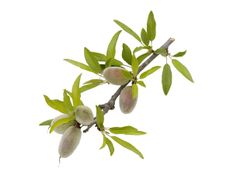 Almond Propagation Methods: Tips On Propagating Almond Trees
Almond Propagation Methods: Tips On Propagating Almond TreesAlmond trees have become a popular nut tree for home gardens around the world. They can be purchased from garden centers and nurseries, or propagated at home from an existing almond tree. Click here to learn how to propagate an almond tree.
By Darcy Larum
-
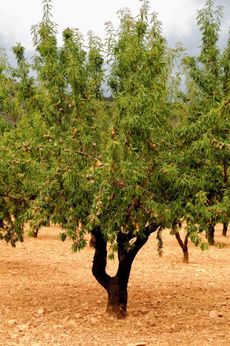 Moving An Almond Tree – How To Transplant Almond Trees
Moving An Almond Tree – How To Transplant Almond TreesDo you have an almond tree that for one reason or other needs to be moved to another location? Then you're probably wondering if you can transplant an almond? If so, click on this article for some helpful almond transplant tips.
By Amy Grant
-
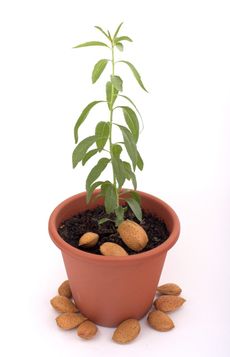 Planting Almond Nuts – How To Grow An Almond From Seed
Planting Almond Nuts – How To Grow An Almond From SeedAlthough almond germination does take a little know how, propagating your own seed grown almond trees is definitely a fun project for the novice or avid home gardener. Click on the following article to find out how to grow an almond from seed.
By Amy Grant
-
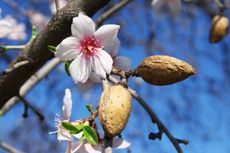 Almond Pest Control – Recognizing Almond Tree Pest Symptoms
Almond Pest Control – Recognizing Almond Tree Pest SymptomsUnfortunately, humans aren?t the only ones that enjoy almonds; there are lots of bugs that eat almonds, or the tree?s foliage. When treating pests on almond trees, it?s important to recognize almond tree pest symptoms. The following article can help with that.
By Amy Grant